梁实秋sonnet 18译文评析
主位结构下莎士比亚《Sonnet 18》及其中译本分析
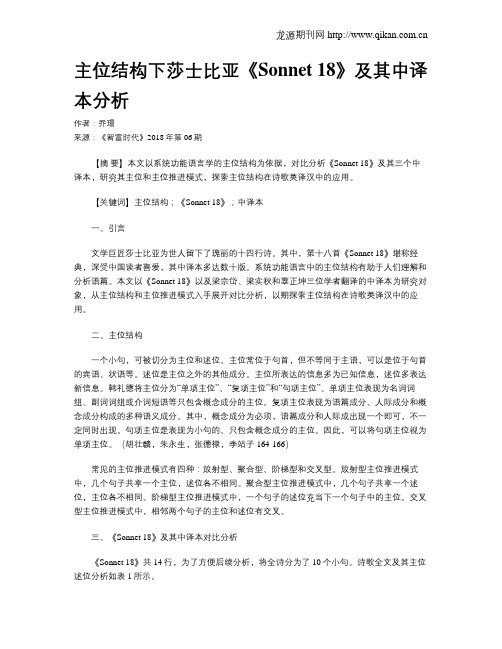
主位结构下莎士比亚《Sonnet 18》及其中译本分析作者:乔瑒来源:《智富时代》2018年第06期【摘要】本文以系统功能语言学的主位结构为依据,对比分析《Sonnet 18》及其三个中译本,研究其主位和主位推进模式,探索主位结构在诗歌英译汉中的应用。
【关键词】主位结构;《Sonnet 18》;中译本一、引言文学巨匠莎士比亚为世人留下了瑰丽的十四行诗。
其中,第十八首《Sonnet 18》堪称经典,深受中国读者喜爱,其中译本多达数十版。
系统功能语言中的主位结构有助于人们理解和分析语篇。
本文以《Sonnet 18》以及梁宗岱、梁实秋和辜正坤三位学者翻译的中译本为研究对象,从主位结构和主位推进模式入手展开对比分析,以期探索主位结构在诗歌英译汉中的应用。
二、主位结构一个小句,可被切分为主位和述位。
主位常位于句首,但不等同于主语,可以是位于句首的宾语、状语等。
述位是主位之外的其他成分。
主位所表达的信息多为已知信息,述位多表达新信息。
韩礼德将主位分为“单项主位”、“复项主位”和“句项主位”。
单项主位表现为名词词组、副词词组或介词短语等只包含概念成分的主位。
复项主位表现为语篇成分、人际成分和概念成分构成的多种语义成分。
其中,概念成分为必须,语篇成分和人际成出现一个即可,不一定同时出现。
句项主位是表现为小句的、只包含概念成分的主位。
因此,可以将句项主位视为单项主位。
(胡壮麟,朱永生,张德禄,李站子 164-166)常见的主位推进模式有四种:放射型、聚合型、阶梯型和交叉型。
放射型主位推进模式中,几个句子共享一个主位,述位各不相同。
聚合型主位推进模式中,几个句子共享一个述位,主位各不相同。
阶梯型主位推进模式中,一个句子的述位充当下一个句子中的主位。
交叉型主位推进模式中,相邻两个句子的主位和述位有交叉。
三、《Sonnet 18》及其中译本对比分析《Sonnet 18》共14行,为了方便后续分析,将全诗分为了10个小句。
Sonnet 18 诗歌赏析
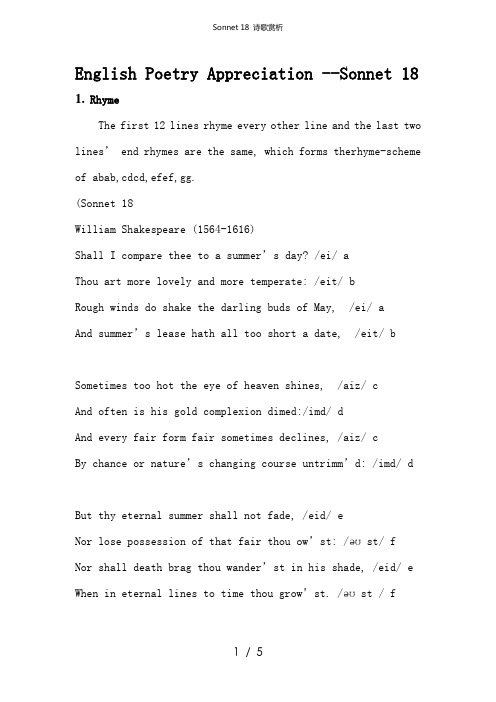
English Poetry Appreciation --Sonnet 18 1.RhymeThe first 12 lines rhyme every other line and the last two lines’ end rhymes are the same, which forms therhyme-scheme of abab,cdcd,efef,gg.(Sonnet 18William Shakespeare (1564-1616)Shall I compare thee to a summer’s day? /ei/ aThou art more lovely and more temperate: /eit/ bRough winds do shake the darling buds of May, /ei/ aAnd summer’s lease hath all too short a date, /ei t/ bSometimes too hot the eye of heaven shines, /aiz/ cAnd often is his gold complexion dimed:/imd/ dAnd every fair form fair sometimes declines, /aiz/ cBy chance or nature’s changing course untrimm’d: /imd/ dBut thy eternal summer shall not fade, /eid/ eNor lose possession of that fair thou ow’st: /əʊst/ fNor shall death br ag thou wander’st in his shade, /eid/ e When in eternal lines to time thou grow’st. /əʊst / fSo long as men can breathe, or eyes can see, /iː/ gSo long lives this, and this gives life to thee./iː/ g)2.MeterEach line in this sonnet is in iambic pentameter which means each line has five feet, usually an unaccented syllable followed by an accented syllable.For example,we can divide the first line into five independent feet as “Shall I / compare / thee to/ a sum / mer’s day?”with accents on shall,com,thee,a,mer respectively. (Sonnet 18William Shakespeare (1564-1616)Shall I/ compare/ thee to/ a sum/mer’s day?Thou art/ more love/ly and/ more tem/perate:Rough winds/ do shake/ the dar/ling buds/ of May,And sum/mer’s lease/ hath all/ too short/ a date:Sometimes/ too hot/ the eye/ of hea/ven shinesAnd of/ten is/ his gold/ complexion dimm’d;And eve/ry fair/ form fair/ sometimes/ declines,By chance/ or na/ture’s changing/ course un/trimm’d;But thy/ eter/nal sum/mer shall/ not fade,Nor lose/ posse/ssion of/ that fair/ thou ow’st;Nor shall/ death brag/ thou wan/der’st in/ his shade.When in/ eter/nal lines/ to time/ thou grow’st:So long/ as men/ can breathe/,or eyes/ can see,So long/ lives this/,and this/ gives life/ to thee.)3.The Rhetorical Devices3.1 Simile and Rhetoric QuestionExample: Shall I compare thee to a summer’s day?Simile: Summer and “you”are not similar on the surface, but virtually they are the representatives of beauty.Rhetoric Question:It is also a rhetorical question, that is, formally it’s a question.Readers don't need to answerbecause the answer is very clear.3.2 MetaphorExample:And summer’s lease hath all too short a date:The summer’s day is compared to a house, which is the thing we lend from the nature. Therefore, it’s period of use is limited, and it also insinuates the time that the duration of youth and beauty is limited.3.3 PersonificationExample:And often is his gold complexion dimm’d;Obviously the poet compares the sun to a man, so he depicts his complexion. (Complexion is usually used to describe someone.)3.4 HyperboleExample:But thy eternal summer shall not fade,According to the laws of nature, every beautiful thing will gradually lose their beauty, so how can the beauty of the person who the poet describes be eternal?4.ThemeIn the beginningquatrain, the poet compares his friend to a beautiful summer’s day in order to arouse readers’wonderful imagination. However, the poet realizes that the metaphor can’t express his high praise for his friend because summerwill fade away though it’s beautiful. Then how to make the beauty of his friend eternal? The poet finally thinks of the poetry. He thinks that with the power of the poem, he can make the beauty of his friend immortal. That is to say, the beauty of his friend is immoral in that the poetry is eternal.In a word, the poem expresses the two themes. For one thing, the poet highly praises the beauty of his friend, and foranother thing, the poet also eulogizes the poetry art’s beauty and immortality.。
Sonnet 18 赏析

e
f
11 Nor shall Death brag thou wander'st in his shade,e 12 When in eternal lines to time thou grow'st. 13 So long as men can breathe or eyes can see, 14 So long lives this, and this gives life to thee. f g g
Alliteration: “And” “And”, “By” “But”, “So” “So”
Simile: “Shall I compare thee to a summer's day?” Metaphor: “And summer's lease hath all too short a date.” Personification: “Sometime too hot the eye of heaven shines” Hyperbole: “But thy eternal summer shall not fade”
Theme: love is the only thing that can conquer all the things in the
world and the beauty is the immortal thing that can neverYOU!
6 And often is his gold complexion dimm'd;
7 And every fair from fair sometime declines,
Sonnet 18的分析
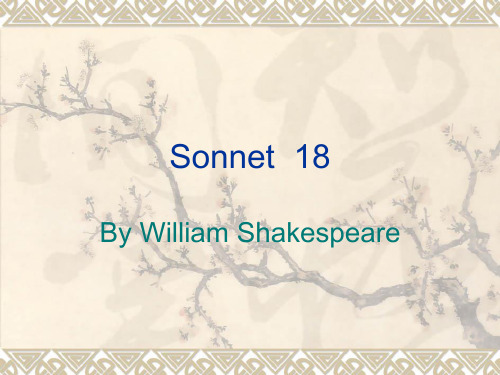
十四行诗起源于13世纪的意大利,16世纪上半叶由英国诗人 萨利和魏阿特引入英国,风靡一时。莎士比亚的十四行诗早 在1960年前发表就以手抄本的形式流传民间,其主题思想以 歌颂爱情与友谊为主。这些诗共154首,分为三组。第一组 (1~126首)写给一位青年男子,诗人告诫他要早些结婚, 生儿育女; 第二组(127~152)描写一位姿色不佳的“黑肤 女郎”(dark lady),诗人对他的态度是毫不掩饰的喜欢; 第三组(153~154)与前两组毫无关系,好像是同一首诗 写了两遍。在韵脚上,莎士比亚创作了自己的诗韵,即有名 的莎士比亚十四行诗韵:abab, cdcd, efef, gg。
万物在春季复苏夏天旺盛所以夏天是生命最旺盛的季节诗歌前六句诗人歌颂了诗中的主人公你作为美的存在却把夏天娇蕾和烈日都比下去因为它们不够温婉太短暂会被遮暗所以你的魅力远远胜于夏天
Sonnet 18
By William Shakespeare
William Shakespeare 1564-1616
He was born on 23 April 1564 and died on 23 April 1616.
you
you
Shall I compare thee to a summer's day? gentle You are Thou art more lovely and more temperate: strong winds lovely charming; Rough winds do shake the darling buds of May, pleasing duration, time allotted has And summer's lease hath all too short a date:
Sonnet18赏析
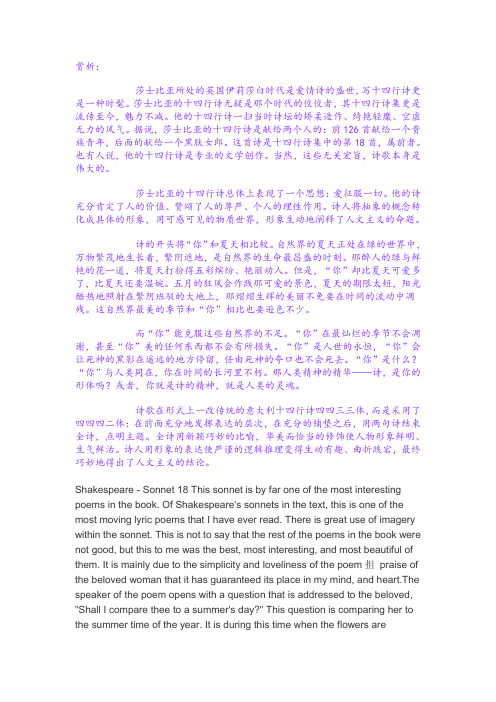
赏析:莎士比亚所处的英国伊莉莎白时代是爱情诗的盛世,写十四行诗更是一种时髦。
莎士比亚的十四行诗无疑是那个时代的佼佼者,其十四行诗集更是流传至今,魅力不减。
他的十四行诗一扫当时诗坛的矫柔造作、绮艳轻糜、空虚无力的风气。
据说,莎士比亚的十四行诗是献给两个人的:前126首献给一个贵族青年,后面的献给一个黑肤女郎。
这首诗是十四行诗集中的第18首,属前者。
也有人说,他的十四行诗是专业的文学创作。
当然,这些无关宏旨,诗歌本身是伟大的。
莎士比亚的十四行诗总体上表现了一个思想:爱征服一切。
他的诗充分肯定了人的价值、赞颂了人的尊严、个人的理性作用。
诗人将抽象的概念转化成具体的形象,用可感可见的物质世界,形象生动地阐释了人文主义的命题。
诗的开头将“你”和夏天相比较。
自然界的夏天正处在绿的世界中,万物繁茂地生长着,繁阴遮地,是自然界的生命最昌盛的时刻。
那醉人的绿与鲜艳的花一道,将夏天打扮得五彩缤纷、艳丽动人。
但是,“你”却比夏天可爱多了,比夏天还要温婉。
五月的狂风会作践那可爱的景色,夏天的期限太短,阳光酷热地照射在繁阴班驳的大地上,那熠熠生辉的美丽不免要在时间的流动中凋残。
这自然界最美的季节和“你”相比也要逊色不少。
而“你”能克服这些自然界的不足。
“你”在最灿烂的季节不会凋谢,甚至“你”美的任何东西都不会有所损失。
“你”是人世的永恒,“你”会让死神的黑影在遥远的地方停留,任由死神的夸口也不会死去。
“你”是什么?“你”与人类同在,你在时间的长河里不朽。
那人类精神的精华——诗,是你的形体吗?或者,你就是诗的精神,就是人类的灵魂。
诗歌在形式上一改传统的意大利十四行诗四四三三体,而是采用了四四四二体:在前面充分地发挥表达的层次,在充分的铺垫之后,用两句诗结束全诗,点明主题。
全诗用新颖巧妙的比喻,华美而恰当的修饰使人物形象鲜明、生气鲜活。
诗人用形象的表达使严谨的逻辑推理变得生动有趣、曲折跌宕,最终巧妙地得出了人文主义的结论。
Shakespeare - Sonnet 18 This sonnet is by far one of the most interesting poems in the book. Of Shakespeare's sonnets in the text, this is one of the most moving lyric poems that I have ever read. There is great use of imagery within the sonnet. This is not to say that the rest of the poems in the book were not good, but this to me was the best, most interesting, and most beautiful of them. It is mainly due to the simplicity and loveliness of the poem抯praise of the beloved woman that it has guaranteed its place in my mind, and heart.The speaker of the poem opens with a question that is addressed to the beloved, "Shall I compare thee to a summer's day?" This question is comparing her to the summer time of the year. It is during this time when the flowers areblooming, trees are full of leaves, the weather is warm, and it is generally thought of as an enjoyable time during the year. The following eleven lines in the poem are also dedicated to similar comparisons between the beloved and summer days. In lines 2 and 3, the speaker explains what mainly separates the young woman from the summer's day: she is "more lovely and more temperate." (Line 2) Summer's days tend toward extremes: they are sometimes shaken by "rough winds" (line3) which happens and is not always as welcoming as the woman. However in line 4, the speaker gives the feeling again that the summer months are often to short by saying, "And summer抯lease hath too short a date." In the summer days, the sun, "the eye of heaven" (line 5), often shines "too hot," or too dim, "his gold complexion dimmed" (line 6), that is there are many hot days during the summer but soon the sun begins to set earlier at night because autumn is approaching. Summer is moving along too quickly for the speaker, its time here needs to be longer, and it also means that the chilling of autumn is coming upon us because the flowers will soon be withering, as "every fair from fair sometime declines." (Line 7) The final portion of the sonnet tells how the beloved differs from the summer in various respects. Her beauty will be one that lasts forever, "Thy eternal summer shall not fade." (Line 9), and never end or die. In the couplet at the bottom, the speaker explains how that the beloved's beauty will accomplish this everlasting life unlike a summer. And it is because her beauty is kept alive in this poem, which will last forever. It will live "as long as men can breathe or eyes can see." (Line 13)On the surface, the poem is on the surface simply a statement of praise about the beauty of the beloved woman and perhaps summer to the speaker is sometimes too unpleasant with the extremes of windiness and heat that go along with it. However, the beloved in the poem is always mild and temperate by her nature and nothing at all like the summer. It is incidentally brought to life as being described as the "eye of heaven" with its "gold complexion". The imagery throughout the sonnet is simple and attainable to the reader, which is a key factor in understanding the poem. Then the speaker begins to describe the summer again with the "darling buds of May" giving way to the " summer抯lease", springtime moving into the warmth of the summer. The speaker then starts to promise to talk about this beloved, that is so great and awing that she is to live forever in this sonnet. The beloved is so great that the speaker will even go as far as to say that, "So long as men breathe, or eyes can see," the woman will live. The language is almost too simple when comparing it to the rest of Shakespeare抯sonnets; it is not heavy with alliteration or verse, and nearly every line is its own self-containedclause, almost every line ends with some punctuation that effects a pause. But it is this that makes Sonnet18 stand out for the rest in the book. It is much more attainable to understand and it allows for the reader to fully understand how great this beloved truly is because she may live forever in it. An important theme of the sonnet, as it is an important theme throughout much of the poetry in general, is the power of the speaker's poem to defy time and last forever. And so by doing this it is then carrying the beauty of the beloved down to future generations and eventually for al of eternity. The beloved's "eternal summer" shall not fade precisely because it is embodied in the sonnet: "So long as men can breathe or eyes can see," (line 13) the speaker writes in the couplet, "So long lives this, and this gives life to thee."(Line 14) With this the speaker is able to accomplish what many have done in poetry and that is to give the gift of an eternal life to someone that they believe is special and outshines everyone else around them. Perhaps it is because of a physical beauty that the speaker see, but I believe that it is more because of the internal beauty as seen in line 2, "Thou art more lovely and more temperate", that the beloved is deserving to live on forever.。
Sonnet 18-1
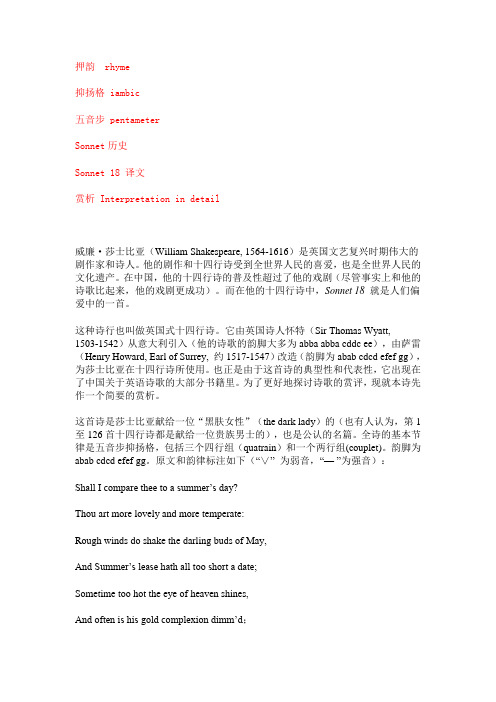
押韵 rhyme抑扬格 iambic五音步 pentameterSonnet历史Sonnet 18 译文赏析 Interpretation in detail威廉·莎士比亚(William Shakespeare, 1564-1616)是英国文艺复兴时期伟大的剧作家和诗人。
他的剧作和十四行诗受到全世界人民的喜爱,也是全世界人民的文化遗产。
在中国,他的十四行诗的普及性超过了他的戏剧(尽管事实上和他的诗歌比起来,他的戏剧更成功)。
而在他的十四行诗中,Sonnet 18就是人们偏爱中的一首。
这种诗行也叫做英国式十四行诗。
它由英国诗人怀特(Sir Thomas Wyatt,1503-1542)从意大利引入(他的诗歌的韵脚大多为abba abba cddc ee),由萨雷(Henry Howard, Earl of Surrey, 约1517-1547)改造(韵脚为abab cdcd efef gg),为莎士比亚在十四行诗所使用。
也正是由于这首诗的典型性和代表性,它出现在了中国关于英语诗歌的大部分书籍里。
为了更好地探讨诗歌的赏评,现就本诗先作一个简要的赏析。
这首诗是莎士比亚献给一位“黑肤女性”(the dark lady)的(也有人认为,第1至126首十四行诗都是献给一位贵族男士的),也是公认的名篇。
全诗的基本节律是五音步抑扬格,包括三个四行组(quatrain)和一个两行组(couplet)。
韵脚为abab cdcd efef gg。
原文和韵律标注如下(“∨” 为弱音,“—”为强音):Shall I compare thee to a summer’s day?Thou art more lovely and more temperate:Rough winds do shake the darling buds of May,And Summer’s lease hath all too short a date;Sometime too hot the eye of heaven shines,And often is his gold complexion dimm’d;And every fair from fair sometime declines,By chance, or nature’s changing course, untrimm’d; But thy eternal summer shall not fade,Nor lose possession of that fair thou ow’st;Nor shall Death brag thou wander’st in his shade, When in eternal lines to time thou grow’st;So long as men can breathe, or eyes can see,So long lives this, and this gives life to thee.∨—∨—∨—∨—∨— a ∨—∨—∨—∨—∨— b ——∨—∨—∨—∨— a ∨—∨—∨—∨—∨— b ∨—∨—∨—∨—∨— c ∨—∨—∨—∨—∨— d ∨—∨—∨—∨—∨— c ∨—∨—∨—∨—∨— d ∨—∨—∨—∨—∨— e∨—∨—∨∨∨—∨— f∨∨——∨—∨∨∨— e∨∨∨—∨—∨—∨— f ∨—∨—∨—∨—∨— g∨—∨—∨—∨—∨— g这里我们不难看出,在第三行里,“rough winds”的出现打破了全诗抑扬格的节奏,使读者感到了夏日里狂风的残暴,从而衬托出了“你”的温柔。
sonnet18诗歌解析
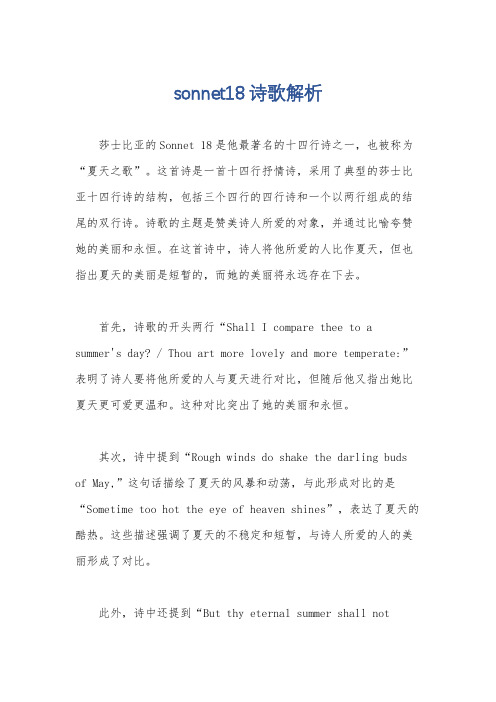
sonnet18诗歌解析莎士比亚的Sonnet 18是他最著名的十四行诗之一,也被称为“夏天之歌”。
这首诗是一首十四行抒情诗,采用了典型的莎士比亚十四行诗的结构,包括三个四行的四行诗和一个以两行组成的结尾的双行诗。
诗歌的主题是赞美诗人所爱的对象,并通过比喻夸赞她的美丽和永恒。
在这首诗中,诗人将他所爱的人比作夏天,但也指出夏天的美丽是短暂的,而她的美丽将永远存在下去。
首先,诗歌的开头两行“Shall I compare thee to a summer's day? / Thou art more lovely and more temperate:”表明了诗人要将他所爱的人与夏天进行对比,但随后他又指出她比夏天更可爱更温和。
这种对比突出了她的美丽和永恒。
其次,诗中提到“Rough winds do shake the darling buds of May,”这句话描绘了夏天的风暴和动荡,与此形成对比的是“Sometime too hot the eye of heaven shines”,表达了夏天的酷热。
这些描述强调了夏天的不稳定和短暂,与诗人所爱的人的美丽形成了对比。
此外,诗中还提到“But thy eternal summer shall notfade”,这句话表达了诗人对所爱人美丽永恒的信念,即使时间流逝,她的美丽也不会凋谢。
最后,诗歌的结尾两行“So long as men can breathe oreyes can see, / So long lives this, and this gives life to thee.”表达了诗人的信念,即只要人类存在,这首诗也将永存下去,而她的美丽也将因此而得以永生。
总的来说,Sonnet 18是一首赞美之歌,通过对比夏天的短暂和变化与所爱人的永恒美丽,表达了诗人对所爱人的赞美和珍视之情。
这首诗以其优美的语言和深刻的意境,成为了莎士比亚诗歌中的经典之作。
莎士比亚-sonnet-18-29-66的中文翻译及评析
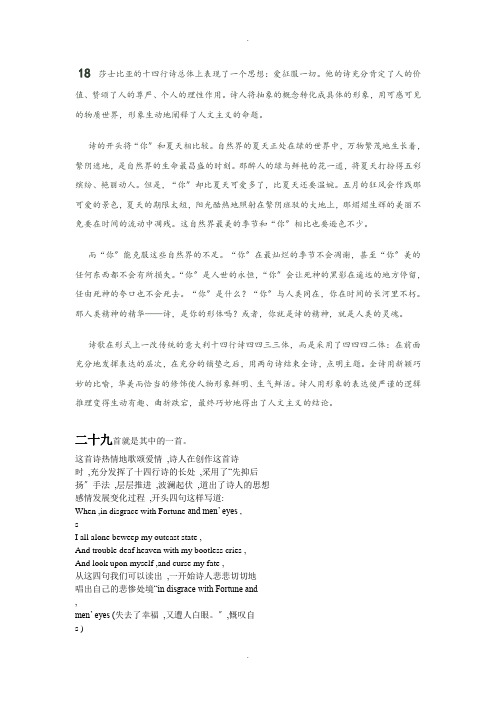
18莎士比亚的十四行诗总体上表现了一个思想:爱征服一切。
他的诗充分肯定了人的价值、赞颂了人的尊严、个人的理性作用。
诗人将抽象的概念转化成具体的形象,用可感可见的物质世界,形象生动地阐释了人文主义的命题。
诗的开头将“你〞和夏天相比较。
自然界的夏天正处在绿的世界中,万物繁茂地生长着,繁阴遮地,是自然界的生命最昌盛的时刻。
那醉人的绿与鲜艳的花一道,将夏天打扮得五彩缤纷、艳丽动人。
但是,“你〞却比夏天可爱多了,比夏天还要温婉。
五月的狂风会作践那可爱的景色,夏天的期限太短,阳光酷热地照射在繁阴班驳的大地上,那熠熠生辉的美丽不免要在时间的流动中凋残。
这自然界最美的季节和“你〞相比也要逊色不少。
而“你〞能克服这些自然界的不足。
“你〞在最灿烂的季节不会凋谢,甚至“你〞美的任何东西都不会有所损失。
“你〞是人世的永恒,“你〞会让死神的黑影在遥远的地方停留,任由死神的夸口也不会死去。
“你〞是什么?“你〞与人类同在,你在时间的长河里不朽。
那人类精神的精华——诗,是你的形体吗?或者,你就是诗的精神,就是人类的灵魂。
诗歌在形式上一改传统的意大利十四行诗四四三三体,而是采用了四四四二体:在前面充分地发挥表达的层次,在充分的铺垫之后,用两句诗结束全诗,点明主题。
全诗用新颖巧妙的比喻,华美而恰当的修饰使人物形象鲜明、生气鲜活。
诗人用形象的表达使严谨的逻辑推理变得生动有趣、曲折跌宕,最终巧妙地得出了人文主义的结论。
二十九首就是其中的一首。
这首诗热情地歌颂爱情,诗人在创作这首诗时,充分发挥了十四行诗的长处,采用了“先抑后扬〞手法,层层推进,波澜起伏,道出了诗人的思想感情发展变化过程,开头四句这样写道:When ,in disgrace with Fortune and men’ eyes ,sI all alone beweep my outcast state ,And trouble deaf heaven with my bootless cries ,And look upon myself ,and curse my fate ,从这四句我们可以读出,一开始诗人悲悲切切地唱出自己的悲惨处境“in disgrace with Fortune and,men’ eyes (失去了幸福,又遭人白眼。
